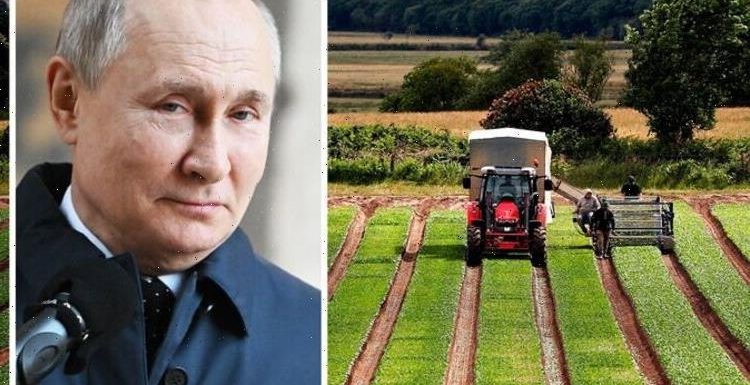
Adam Henson on how nitrogen fertiliser presents 'conundrum'
We use your sign-up to provide content in ways you’ve consented to and to improve our understanding of you. This may include adverts from us and 3rd parties based on our understanding. You can unsubscribe at any time. More info
The warning came from the Energy & Climate Intelligence Unit (ECIU), whose analysis has indicated that British farmers already faced £160million in additional fertiliser bills last year as a result of volatile gas prices. Many of the primary chemical and mineral fertilisers are made using methane — derived from pipeline gas — as a main ingredient, the production processes also call for significant amounts of energy, further tying the cost of fertiliser to gas prices. In fact, last Autumn, the impacts of the rising cost of gas resulted in a number of fertiliser factories being forced to close their doors.
Both gas and fertiliser prices are rising again as a result of Putin’s invasion of Ukraine.
The red diesel used by the agricultural sector, for example, reached 76.9 pence per litre in late February compared to just 52.6 pence per litre at the same time last year.
Alongside being a key fuel supplier, Russia is also one of the world’s largest manufacturers of fertiliser, responsible for 13 percent of the global supply, with the UK having imported 22,000 tonnes of their product in 2020 alone.
Recent reports from commodities brokers place the cost of ammonium nitrate, which is used as a source of nitrogen for fertiliser, has reached £925 per tonne — four times its 2020 price — forcing many farmers to ration their fertiliser use to compensate.


These figures followed the suggestion by Russia’s trade and industry ministry on March 4 that their fertiliser manufacturers suspend exports in the wake of the sanctions imposed on Russia by the West after the invasion of Ukraine.
These sanctions included the suspension of cargo shipping lines both to and from Russia.
In a statement, the Russian ministry said it had recommended that “Russian producers temporarily suspend export shipments of Russian fertilisers until carriers resume rhythmic work and provide guarantees that Russian fertiliser exports will be completed in full.
“Failures in fertiliser shipments could have a direct impact on national security in several countries and cause serious food shortages for hundreds of millions of people already in the medium term.”


ECIU Climate and Land Programme lead Matt Williams said: “On top of Russian sabre-rattling around fertiliser supplies, farmers find themselves on the end of a fossil fuel double whammy, with higher costs of both fertiliser and energy due to the oil and gas crises.
“This is compounded by recent extreme weather hurting potato, wheat and orchard harvests in the UK.”
He added: “We need to think about fertiliser and food security.
“Clean, net zero, homegrown solutions exist, but those British agritech companies leading the way must be given a boost if we’re going to insulate both British farmers and the British shopping basket as best we can from oil and gas price spikes and the aggression of rogue leaders like Putin.”
Alongside working to develop our own low carbon and net zero fertilisers, the ECIU said, Britain’s dependence on Russian fertiliser and gas could be reduced by developing glasshouses that are kept warm using heat pumps powered by renewable energy.
DON’T MISS:
New mutant ‘XE’ Omicron variant could be most transmissible yet [REPORT]
Putin humiliated as Britain refuses Russia’s plan to boost economy [INSIGHT]
World War 3 risk ‘high’ as China, North Korea and Iran exploit West [ANALYSIS]

Chair of the All Party Parliamentary Group on Farming Fay Jones MP said: “The tragic situation in Ukraine is pushing fertiliser prices beyond the record highs already seen in 2021 due to gas prices.
“For many farmers, this is making a bad situation even worse, hitting them in the pocket, while these fertilisers made from fossil fuels continue to drive climate change.
“Many farmers have been working to find ways to reduce their carbon footprint, but they need more help decarbonising, cutting their use of fossil fuels, and reducing the use of fertilisers where possible.
“Innovative British companies can help to pave a new path by developing and marketing low-carbon fertilisers, creating jobs here in the UK.”
Among the firms working to produce low-carbon fertilisers is CCm Technologies, who take waste carbon and other waste products from industry and agriculture and use this to produce a fertiliser as effective as conventional ones but with a tenth of the carbon footprint.
CCm Technologies CEO Pawel Kisielewski said: “There is a growing market for alternative fertilisers such as ours, that use waste products and captured carbon dioxide to deliver solid crop yields while using at least 20 percent less applied nitrogen and phosphate.
“In real terms, the deployment of 50 of our standard production units could result in emissions savings equivalent to removing around 375,000 cars from the road each year.”
Another firm, the Small Robot Company, is working to develop small robotic technologies that would allow farmers to use fertilisers more effectively — thereby cutting down on the volumes required.
The full findings of the report were published on the ECIU website.
Source: Read Full Article